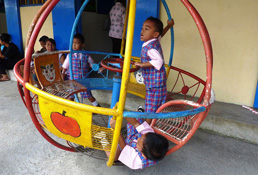
KSF Mission Statement
Whilst Indonesia’s economic progress over the last decade has seen it become a ‘middle income’ country, gains from national economic prosperity remain unfelt by many Indonesian families. An estimated half of Indonesia’s 240 million people still live below or critically close to the national poverty line making them highly vulnerable to social and economic instability.Of the 163,000 children who die before the age of five, half are as a result of easily preventable diseases and many have malnutrition as the underlying cause.
Whilst malnutrition can kill, poor nutrition also compromises a child’s physical growth and has a long-term detrimental effect on a child’s ability to learn.
Additionally, with approximately two million children failing to finish primary school – as a result of absenteeism, ill health and poor quality of education – Indonesia’s children are facing considerable challenges in the fight to break free from the cycle of poverty.
Health is crucial in the early years
The quality of care, health, nutrition and protection we give to a child in their first years of life is crucial to their long term futures.The need to provide quality basic healthcare and nutrition must go hand in hand with services that nurture early childhood development. The years between 0 and 5 are crucial to ensuring children not only survive and grow healthily but that they also develop the language and learning skills they need to thrive as adults in society as well as positive attitudes of self esteem, creativity, self reliance, social skills, self confidence and discipline.
Given that by the age of two years, 80% of the individual’s brain development is complete, it is clear that early childhood development is essential in securing the child’s future, that of their local community, and ultimately the future of Indonesia as a nation.
KSF’s Posyandu Revitalisation programme
KSF’s Posyandu Revitalisation programme improves upon the traditional healthcare and nutrition services provided by Posyandu by integrating activities that promote early childhood development, creating what we call ‘Taman Posyandu’ or ‘Posyandu Plus.’‘Taman Posyandu’ or ‘Posyandu Plus’ address the vital need to assimilate early childhood physical health with mental and psycho-social development. In addition to providing health and nutrition services, Taman Posyandu offer learning and play activities for 2-5 year old children, at least two to three times a week. These activities are essential in stimulating children’s cognitive, motor and social skills to emotionally, physically and intellectually prepare them for primary school.
KSF also provides essential healthcare equipment such as weighing scales, Mother and Child Health Books (Buku KIA) and other educational materials such as posters, booklets and volunteer training books.


Tragically for these children, the major killers are otherwise preventable diseases such as upper respiratory tract infections, diarrhoea, measles and tuberculosis.
60% of these deaths have malnutrition as an underlying cause and most are the result of a lack of knowledge by mothers and families to identify health problems early, while they can still be easily treated.

Indonesia has over a quarter of a million Posyandu (community maternal and infant heathcare and nutrition posts) functioning throughout its villages
Building the capacity of Posyandu volunteers
Posyandu employ the ‘Five Table’ method which consists of five volunteers at five posts at which children are registered, weighed, immunised, given vitamin supplements and offered nutritional counselling.
Posyandu volunteers receive training to provide efficient and effective services in immunization, weighing and registration and growth monitoring as well as counselling on nutrition, family planning, breast feeding and household sanitation. This equips them with up to date knowledge and skills to offer support to mothers and parents, and most importantly, enable them to detect child health issues early and understand their children’s psychosocial development needs.
Key health figures and government officials are also exposed to new and effective methods of distribution, client service, epidemiology and technical developments and a community mentor group is established to maintain support for government officials and health volunteers.
- Created 255 'Taman Posyandus' that integrate posyandu’s health and nutrition services with early learning activities in the districts of Gianyar, Solok, Gresik, Blitar and Kebumen.
- Reported no malnourished infants in KSF supported Posyandus.
- Retrained over 1,275 Posyandu volunteers to detect child health issues early, improve health & nutrition counselling and lead early learning activities.
- Provided almost 25,000 babies and young children and 1,000 pregnant women with essential health and nutrition interventions.
- Educated thousands of parents to monitor their child’s growth, complete immunisation and support their child’s early psycho-social development.
- Built local government capacity to invest own funds for the long term implementation of Posyandu Revitalisation in five districts of Indonesia.
THE INDONESIAN ‘GOTONG ROYONG’ SPIRIT OF COMMUNITY SELF-HELP AND FEMALE EMPOWERMENT.
These incredible women who run Posyandus take valuable time out of their lives to give children a safe and happy place to learn, play and grow by providing Posyandu volunteers with regular training, uniforms, books and other resources. Their commendable contribution to their communities must not go unnoticed.
With your help, KSF can work with local governments to ensure that Posyandu volunteers are valued and financially supported in the long term, so that they are given a renewed sense of pride and motivation in their work.

